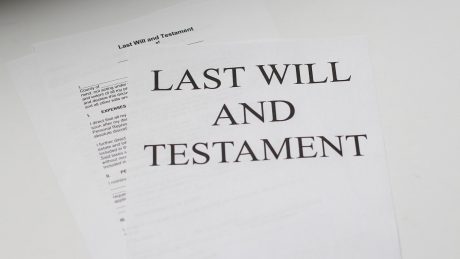The recent case of Boast v Ballardi highlights the importance and complexity of assessing a testator’s capacity to make a will where delusions are involved. In this article, Emma Holland and Judith Swinhoe-Standen examine the decision.
Attempts are sometimes made to overturn wills on the basis that decisions made by the testator due to delusional beliefs should not be upheld. In other words, the testator did not satisfy the fourth limb of the test set out in the case of Banks v Goodfellow, namely that they were not affected by a disorder of the mind or insane delusion. In those cases, the court will examine the deceased’s capacity leading up to and including the time of the testator’s decision, relying on contemporaneous and/or retrospective medical evidence.
Boast v Ballardi
In Boast v Ballardi, the deceased had made a will in 2006 under which the claimant (Gavin, the deceased’s great-nephew) was the sole executor and beneficiary. The deceased made a further will in 2013, appointing Gavin as executor again and leaving him a pecuniary legacy of £15,000, with the residue going to the deceased’s sisters. Gavin sought to overturn the 2013 will on the grounds that the deceased lacked capacity to execute it due to delusions he experienced.
In late 2011, after spending some months in hospital, the deceased went to live with a nephew (Terry) and his partner (Sila). Although it is not entirely clear from the judgment, we believe Gavin is Terry’s son. In March 2012, Dr Ashford diagnosed the deceased with a dementia illness and described him as having “persecutory delusions”, mainly about Sila. He said the deceased was “thinking she [Sila] is out to harm him in various ways” and was “a professional hypnotist and that he is therefore completely under her power as are various other people”.
Days later, the deceased informed his solicitor (JM) that he wanted to make a new will. JM sought Dr Ashford’s advice. Dr Ashford met the deceased again in May 2012 and opined that “[the deceased’s] capacity to make decisions around his finances [was] already significantly impaired”. He said he “would have similar concerns about his testamentary capacity” as he had “persecutory delusions that could influence his decisions about how he disposes of his property in his will”.
In April 2013, the deceased indicated that there was a risk Sila would disappear with his money and assets. JM suggested obtaining another medical opinion but sent the deceased a draft will on 30 May 2013. On 14 June 2013, JM visited the deceased to find that he had signed the draft will with three attesting witnesses, a doctor allegedly having visited him that day. Although JM expressed concern about the deceased’s mental state, he accepted the deceased’s assurances that all his problems were physical.
On 31 July 2013, it was decided the deceased should move to residential accommodation due to his delusional beliefs. Meanwhile, the deceased had written to JM asking to add Gavin’s sister to his will and expressed suspicion of Gavin, querying “whose side he [was] on”. Of Sila, the deceased said she was “planning to flit in the near future, leaving a possible collapse of the whole outfit”. JM had not updated the will but had added a note to his file stating, “wait for doctors?”.
The court determined that the 2013 will was invalid due to lack of capacity. The deceased’s “intensely irrational persecutory delusions” about Sila had extended to Gavin and caused the deceased to exclude Gavin from receiving anything other than a pecuniary legacy under the 2013 will. The court concluded that the 2006 will was valid and should be upheld.
How have the courts treated irrational delusions in the past?
If a will appears rational on its face, the court will presume that the testator had capacity, and it is up to the person objecting to the will to raise a real doubt about capacity. If they do so successfully, the burden of proof falls on the propounder of the will to establish capacity. The extent to which a testator’s delusions are plainly irrational will also likely impact how the court will approach a matter.
There are circumstances where obvious question marks arise about a testator’s capacity due to the extremity of their beliefs. For example, the court ruled that the wills in question were invalid in the Victorian cases of Smith v Tebbitt, where the testator believed that she was the Holy Ghost, and Dew v Clark, where the testator believed his daughter was “the devil incarnate”, leading him to disinherit her.
Red flags were also raised in the seminal case of Banks v Goodfellow, where the testator thought he was being “personally molested by a man who had been long dead, and that he was pursued by evil spirits whom he believed to be visibly present”. There, however, the court found the will to be valid as the imaginary dead man had had no influence on the deceased’s testamentary decisions.
Ledger v Wootton took a more holistic approach towards the deceased’s capacity. The deceased had made a will that made no provision for three of her five children. The claimant (one of the disinherited children) alleged that the will was invalid due to the deceased’s long history of mental illness. The deceased had experienced paranoid delusions a year before executing her will and subsequently. For example, she believed she was being persecuted by Jehovah’s Witnesses, who were breaking into her house and substituting fruit in her fruit bowl.
Notwithstanding the lack of evidence that a delusion had directly influenced the terms of the will, the court treated the deceased’s delusions as demonstrating more generally a real doubt as to her capacity. It considered there was a possibility that her beliefs had affected her capability to weigh relevant factors when making her will. The executors of the will had not been able to rebut that doubt to establish capacity. Accordingly, the court concluded that the deceased lacked testamentary capacity when she made her will.
How have the courts treated seemingly more rational delusions?
It is much trickier to identify a delusion and, subsequently, whether that delusion affects capacity where the delusional belief is rational on its face.
Clitheroe v Bond is an example of this. The testator believed her daughter had stolen from her, was a “shopaholic”, and would “fritter away” any inheritance left to her. She had expressed these beliefs consistently over a period of time, and her medical records suggested she had capacity. She decided to exclude her daughter from her will and leave everything to her son. The daughter challenged the validity of the deceased’s two latest wills. In May 2021, the court agreed that they were invalid, finding there was no factual basis for the testator’s beliefs about her daughter and that those beliefs were delusions. For a delusion to exist, the court found that the relevant false belief had to be irrational, fixed in nature and out of keeping with the person’s background.
The son appealed this decision. One of his grounds of appeal was that the court had misapplied the test for delusions. In particular, the previous judge had erred by failing substantively to consider whether it was necessary to show it had been impossible to reason the testator out of her false beliefs. The appeal judge agreed with the previous judge that it did not need to be shown to be impossible to reason the deceased out of her false belief. However, the judge felt the previous judge had not taken full account of the need for a false belief to be “fixed” in order to amount to a delusion. Notwithstanding this, the appeal judge upheld the previous judge’s decision that the two wills were invalid.
Ritchie v Joslin is another example of the testator’s beliefs seeming rational but later transpiring to be delusional. The deceased left almost all her £2.5m estate to a charity. Her main reasons for disinheriting her four children were that she believed they did little or nothing to help her. She had given them no assurance that her farm would be theirs after her death and had accused some of them of being after her money. The children contended this was simply untrue.
The capacity assessment conducted at the time of the will’s execution was criticised, and consequently, two retrospective capacity assessments were undertaken. One of the experts noted that the deceased “was in fact totally dependent on her children and well supported by them”, considered she suffered from obsessive-compulsive disorder and believed that her actions were “motivated by anger, suspicion and paranoia”. He found that the deceased had lacked testamentary capacity as a result. The other expert considered that the deceased retained testamentary capacity as her possible personality disorders were not of the extent that they affected her powers of judgment in respect of making her will.
The court found that while the deceased’s allegations against her children were untrue, the deceased did believe they were true. Consequently, her beliefs were delusional and affected her testamentary capacity as the testamentary decisions she made resulted from her false beliefs.
Conclusion
The case law mentioned above indicates that many delusions relate to the nuances of everyday family relationships. These must be explained to a capacity assessor before they carry out their assessment, particularly when a testator is considering excluding family members from their will. The assessor will need to examine the reasons behind that choice to consider whether they are valid or rational.
From a solicitor’s perspective, alarm bells should ring when a testator gives instructions to exclude particular close relatives from their will. The so-called “golden rule” provides that when a seriously ill or elderly testator is making a will, it should be witnessed or approved by a medical practitioner who has satisfied themselves of the testator’s capacity. It would be sensible for this rule to extend to circumstances where a testator either has a known history of delusions or seeks to exclude from their will seemingly close family members for extreme reasons that cannot be verified.
You can find further information regarding our expertise, experience and team on our Trust and Probate Litigation page.
If you require assistance from our team, please contact us.
Subscribe – In order to receive our news straight to your inbox, subscribe here. Our newsletters are sent no more than once a month.







